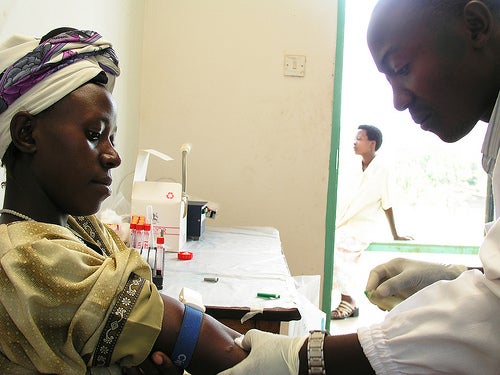The poor cannot afford to pay  money for health care so they use mainly free government-run health services. Isn't that what you were always told? So if donors want to help the poor they should give their money to governments that provide such services for the poor. I am sure you have read that in many books and articles.
money for health care so they use mainly free government-run health services. Isn't that what you were always told? So if donors want to help the poor they should give their money to governments that provide such services for the poor. I am sure you have read that in many books and articles.
Wait, let’s run that scene once more in real time. What actually happens out there in the real world? Often the government clinics described above have difficulty hiring staff, especially in poor rural areas. The majority of young health workers prefer to live in urban areas where they feel safer and can bring up their children with good schools, near family and friends. Long wait times and lack of medicines at government-run health facilities make the private health sector more attractive to consumers.
There is now a growing body of evidence that the poor often use the private health sector (non profit and for profit) instead of government health services. In Africa and South Asia, the private sector is providing over half of all services, to rich and poor, urban and rural populations.
Why is this important? Well, in most countries governments and donors haven't reserved a seat at the table for the private health sector which translates into restrictive policies, poor oversight, and lack of dialogue. Taken together, these things actually inhibit the private health sector. What do I mean by private health sector? While there is no consensus on what that covers, a holistic definition encompasses all non-state actors in the health sector, including faith-based organizations and non-governmental organizations as well. That means private hospitals, clinics, laboratories, pharmacies, and the people working in these establishments such as doctors, nurses, midwives, pharmacists, and informal providers of health services. It has also come to mean producers and distributors of pharmaceuticals as well as health education institutions. Sometimes it also means unlicensed vendors, charlatans and quacks trying to earn a quick buck.
In a time of strapped national budgets, how can governments unlock the potential of the private health sector and regulate it more effectively? The Private Health Policy Toolkit for Africa was designed to help gover
The Toolkit takes visitors through the policy cycle process, beginning with assessment of the private health sector, through policy design, implementation and evaluation. Along the way, the Toolkit provides best practice tips (example below left), templates, terms of reference, and top level reports on engagement tools from accreditation to vouchers.
Development of the Toolkit by the Health in Africa Initiative included extensive collaboration with the IFC, WBI and development partners such as United States Agency for International Development (USAID), Rockefeller Foundation and Pharmaccess. We also a
Check out the Private Health Policy Toolkit for Africa.

Join the Conversation